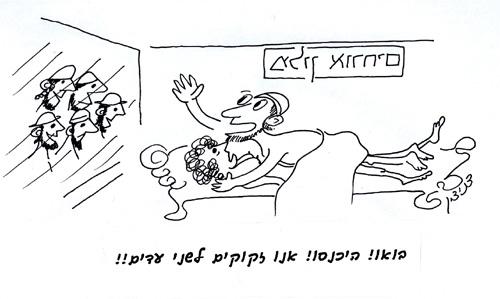
The sages discussed the rule for a man who sanctifies a woman in marriage without two witnesses, in private, or in front of only one witness, According to one sage, Rav Yehuda, if one witness testifies that they were wed and one member of the couple denies it, the testimony of the witness is not accepted, but if the couple admit that they were wed in front of a single witness, sometimes they are considered married and sometimes not. Another sage, Shmuel, came out strongly with the opinion that they even if the couple admit that they were wed in front of a single witness they are not married, because in his opinion two witnesses are needed for the act of matrimony. The scholars asked: A divorced man who sleeps in a hotel room with his ex-wife — according to the study hall of Shammai we need not suspect they have remarried, and according to the study hall of Hillel we do, and therefore he must give her a second divorce. Their disagreement, the scholars understood, is a case in which only one witness was present in the hotel room and testified that they had sexual relations for the purposes of matrimony. This means that the study halls of Shammai and Hillel disagreed about a couple who were wed in the presence of only one witness. Answer: The divorced man and his ex-wife went into a hotel room alone and two witnesses saw them going in, but did not see what they did within. According to the study hall of Shammai we do not suppose that they had sexual relations for the purpose of matrimony, and according to the study hall of Hillel we do, so the man must divorce her a second time. The scholars went on to ask about two men who come from abroad with a woman and a suitcase. One of the men claims that the woman is his wife, the other man is his servant, and that the suitcase belongs to him. The second man claims the opposite, and the woman claims that both men are her servants and that the suitcase is hers. The sages ruled that she must obtain divorces from both men because we do not know to whom she is actually married. This must be, the scholars argue, a case in which there is only one witness. Answer: The woman, in this case, is not considered married and may marry another without obtaining the divorces. The reason the sages ruled she must obtain divorces from both men is so she may take part of the suitcase, which she claims is hers, as payment of her ketubah. In the end the scholars decided that marriage must take place in front of two witnesses, and if there was only one witness, though both parties agree they were wed, the marriage is not valid.
(Babylonian Talmud, Tractate Kiddushin 65a-b)
